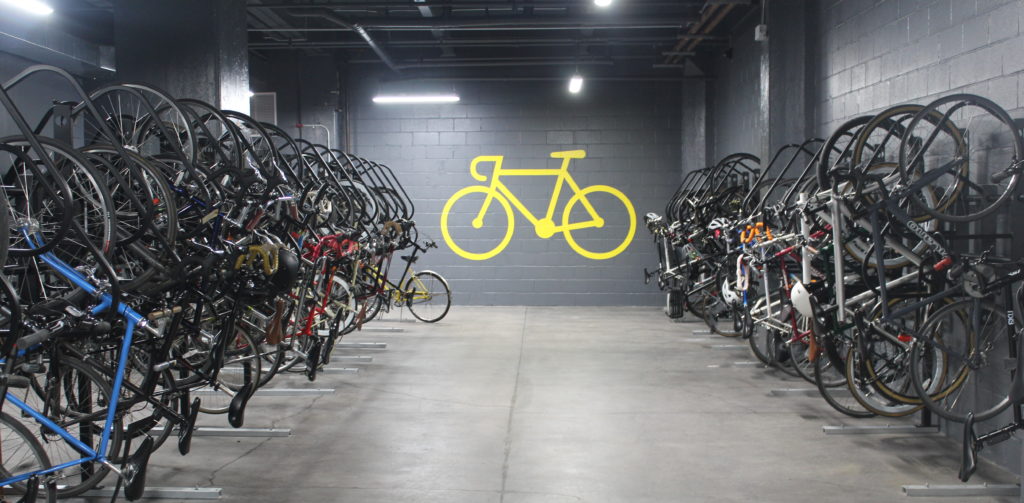The amenities war that has broken out among real-estate developers has produced all kinds of perks: roof decks, billiard rooms, party spaces, and even sailboat valets. Now add one more amenity that is passing quickly from luxury to necessity: indoor bicycle parking. Not just a cramped closet next to the boiler room, but a spacious, organized crib for those precious wheels.
Call it a virtuous cycle–New York City is in the midst of a bicycling boom, with at least one Brooklyn commuting corridor carrying more bikes than cars. An estimated 828,000 New Yorkers ride a bike regularly; in 2011-16, cycling to work grew twice as fast in NYC as in other large U.S. cities. The result is demand for bike parking in both residential and office buildings.
One of the spiffiest new bike rooms is at 45 Main St. in Dumbo, where owner Two Trees Management spent $1 million creating a space that looks like a well-maintained subway station, with shiny floors and sparkling wall tiles. The bike room has entrances on two sides of the building; ramps even have slots to keep wheels steady while entering and exiting.
The 45 Main St. bike room has access on two sides of the building (Photo by Arden Phillips)
The new bike room is a benefit to everyone in the building, not just the bikers, says Dan Conlan, director of commercial leasing at Two Trees. “So many people bike to work. And they had to carry their bikes up the stairs or go in the elevator, which takes up space. And it’s better to not have bikes in the elevator if you don’t have to.”
While bike parking is considered an amenity, it’s also fostered by New York City law. The city requires certain types of commercial buildings to provide bike parking under the Bicycle Access to Office Buildings Law, which applies to commercial office buildings with at least one freight elevator.
At the Brooklyn-Roosevelt apartment building, the old vault has been turned into bike storage (Photo courtesy of the Brooklyn-Roosevelt)
Some companies, like the WeWork co-working chain, actively encourage commuter biking as a healthy, money-saving lifestyle. WeWork facilities throughout Brooklyn provide their bikers with ample storage space. “Rows of hooks and racks keep your prized velo safe on the premises,” says the facility’s website, “just pop a wheelie into your spot.”
New residential buildings have made bike rooms a priority as well. At 388 Bridge St., a 53-story apartment tower in Downtown Brooklyn, residents have access to three bike rooms in the basement, which collectively provide parking spots for 190 bikes.
At the Brooklyn-Roosevelt, a former bank turned into a residential building situated on the border of Bushwick and Bedford-Stuyvesant, residents can store their wheels in the “bike vault,” which is literally the bank’s old vault. The storage space is under 24-hour camera surveillance.
A prototype of Oonee, a modular bike-storage pod, is in use at the Brooklyn Navy Yard (Photo courtesy of Oonee via Instagram)
But what about parking on the street, where around half of all urban cyclists have had a bike stolen? Shabazz Stuart, a bike-riding entrepreneur, is developing Oonee, a smart, modular bike-storage pod. The idea is to take the idea of the bike cage, which can be found in some places like train stations, and make it an attractive public amenity. “We went from thinking about secure bike parking to infrastructure that was community-centric, and public-space enhancing,” Stuart told Fast Company.
Cyclists would access the colorful kiosks via an app and pay a monthly membership fee of no more than $11. The startup, which unveiled its prototype this spring in the Brooklyn Navy Yard, explains the origin of its name on the company website: “Just like the sea urchin from which its name derives, Oonee is equipped with safety features to protect its valuable interior cargo.” The company plans to launch more pods across the city this summer.
